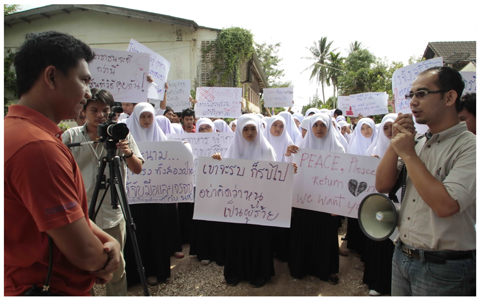Is Emergency decree the cause of escalated violence?
 The unrest situation in the Deep South has sowed the seeds of mutual distrust between security forces and Muslim students which occasionally led to open frictions between them and protests by the students.
The unrest situation in the Deep South has sowed the seeds of mutual distrust between security forces and Muslim students which occasionally led to open frictions between them and protests by the students.
A case in point was the incident on June 4 when about 200 students of Rajabhat University’s Yala campus rallied in front of their campus to demand justice for two students, Ilyas Sama-ae and Soekree Tae, secretary-general of Federation of Yala Students, arrested by security forces from a house in Muang district of Yala on May 31. The two students were apprehended together with Nuraman Doloh, an employee at Ibnu Alfan cooperative in Yala.
An open letter was later handed over to Lt-Col Pichet Deedecho, commander of Yala 11 Task Force, by representatives of the protesting students seeking justice for Ilyas and Soekree who were eventually released. But Nuraman still remains in custody.
Lt-Col Pichet said security forces raided the house where the three were arrested because it was suspected might harbor suspected insurgents and bomb-making materials. Also, he said that security was stepped up at the time because there was a tipoff that the insurgents might set off bombs to disrupt the celebration of the city’s pillars.
The army officer insisted that there were evidences implicating Nuraman of involvement in the bombing of a karaoke bar a few years back. He maintained the two students were not arrested but simply "invited" for interrogation. He defended that the security forces did not overact in carrying out the house raid, adding that the raiders themselves had to take special precautions because they didn’t know whether the men in the house were armed or not.
Soekree complained about the emergency decree saying that the law had caused bad feelings among the local people. Speaking to the Southern News Centre, he recalled the incident saying that more than 10 men in plainclothes arrived at the house at about 8 p.m. and demanded a search. Although no illegal items were found in the house, the three of them were escorted out of the premise and taken to the Task Force base for interrogation.
The student leader said that the three of them were separately interrogated until about one a.m. of the next day after which they were give a rest until morning when forensic officials arrived to take their DNA samples
He said he and Ilyas, the other student, were set free but Nuraman was taken to Wang Phaya camp of the 41st ranger regiment for detention and further interrogation.
Soekree blamed the emergency decree as the major source of human rights violations and extension of the unrest problem. If it is necessary that the decree has to be enforced, he said that the law must be used with special caution taking into account the sentiments of the local people.
The student leader also defended that the main activities of the student body concerned human rights issue but the security officers often viewed the activities with suspicion and mistrust. He suspected the raid was intended the discredit the student’s movement.
"I do not understand why the authorities did not arrest Naruman at his residence as they knew where he was living," said Soekree.
Earlier in June, Pol Col Thawee Sodsong, secretary-general of Southern Border Provinces Administration Centre, held a meeting with about 200 former detainees arrested on security-related charges and eventually acquitted by the court to discuss compensation for these people.
One of the former detainees, Samarn Ma, said he spent about two years behind bar before he was acquitted by the court. He said his family broke up after his detention and he could not find any job because no one was willing to hire him after having learned of his background.
Samarn said he was very happy that the government would consider paying them compensation for the mistaken arrest and detention.
